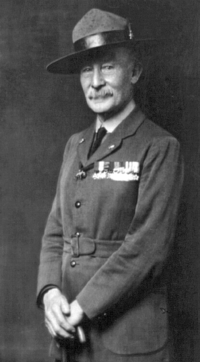B-P
| Lord Baden-Powell | |
|---|---|

Founder of Scouting
|
|
| Birth name | Robert Stephenson Smyth Powell |
| Nickname(s) | B-P |
| Born |
22 February 1857 Paddington, London, England, UK |
| Died |
8 January 1941 (aged 83) Nyeri, Kenya |
| Buried | St. Peter's Cemetery, Nyeri, Kenya (0°25′08″S 36°57′00″E / 0.418968°S 36.950117°E) |
| Service/branch | British Army |
| Years of service | 1876–1910 |
| Rank | Lieutenant-General |
| Commands held |
|
| Battles/wars | |
| Awards |
|
| Other work | Founder of the international Scouting Movement; writer; artist |
| Signature | |
Lieutenant General Robert Stephenson Smyth Baden-Powell, 1st Baron Baden-Powell, OM GCMG GCVO GBE KCB DL (/ˈbeɪdən ˈpoʊ.əl/ BAY-dən POH-əl) (22 February 1857 – 8 January 1941) was a British Army officer, writer, author of Scouting for Boys which was an inspiration for the Scout Movement, founder and first Chief Scout of The Boy Scouts Association and founder of the Girl Guides.
After having been educated at Charterhouse School in Surrey, Baden-Powell served in the British Army from 1876 until 1910 in India and Africa. In 1899, during the Second Boer War in South Africa, Baden-Powell successfully defended the town in the Siege of Mafeking. Several of his military books, written for military reconnaissance and scout training in his African years, were also read by boys. In 1907, he held a demonstration camp, the Brownsea Island Scout camp, which is now seen as the beginning of Scouting. Based on his earlier books, he wrote Scouting for Boys, published in 1908 by Sir Arthur Pearson, for boy readership. In 1910 Baden-Powell retired from the army and formed The Boy Scouts Association.
...
Wikipedia
